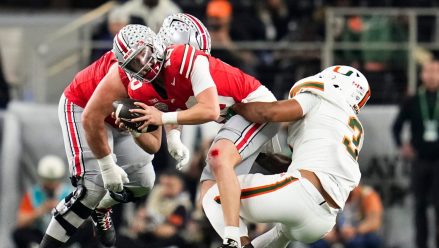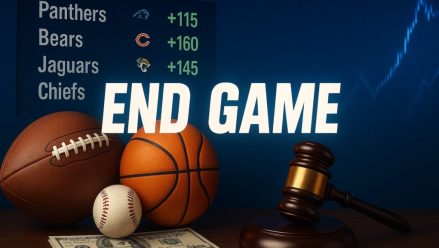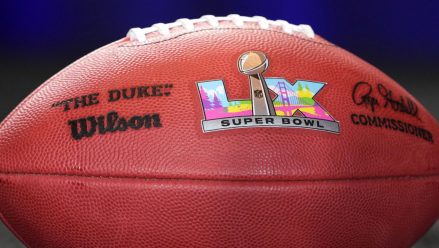Never mind Mr. Smith going to Washington. This was Mr. Kyrollos going to Wyoming.
In November, professional sports bettor Gadoon Kyrollos — “Spanky” to you and me, and Jersey through and through — was invited by the Wyoming Gaming Commission to discuss the idea that America’s online sportsbooks limit winning and otherwise sharp bettors.
While he was told appearing on Zoom would be fine and dandy, he instead decided to hit the trail and head out to Wyoming.
“I had one of the best steaks I’ve ever eaten,” Spanky told InGame. “Cowboys know how to cook a steak. It was dark out there at night, though. Really dark. Not something we Jersey guys are used to.”
Another note on Wyoming that we Jersey guys aren’t used to: “Everyone was friendly and kind,” he said.
Pleasantries out of the way, Spanky — as part of American Bettors’ Voice — detailed to the commission what he believes is happening in the industry as it pertains to bettors getting limited to pennies.
Last week, the findings were announced.
Drumroll, please
“We have now gotten all of the information from all of the operators, on all of the limiting in the state of Wyoming, and very, very few Wyoming customers are being limited. Less than one percent of Wyoming customers are being limited by any of the operators,” said Michael Steinberg, deputy director, special agent supervisor of gaming compliance for the Wyoming Gaming Commission, during a special meeting of the commission.
“It’s just not a very big practice and, from speaking to all the operators, it’s not a big practice nationwide, but certainly not a big practice in Wyoming.”
Not everyone was convinced.
As for Spanky?
“I appreciate Wyoming for taking it seriously and moving quickly,” he said. “They welcomed me, gave me the opportunity to speak, and allowed the American Bettors’ Voice to be heard. I thank them for that, even if the conclusion wasn’t what I expected.”
He believes the findings might be correct but the small pool of bettors creates uncertainty. As he noted, Wyoming bettors have accounted for 0.12% of sports betting handle across America post-PASPA.
“Even they acknowledged in their conclusion that what they found may not reflect the broader picture,” Spanky noted. “That’s understandable given the sample size.”
Steinberg: “I’m not saying that that doesn’t occur [elsewhere], but not here in Wyoming.”
Furthermore, Steinberg said the gaming commission has received the sum total of zero complaints on limiting from customers.
“Some people said Wyoming threw shade at me, but I don’t feel that way,” Spanky said. “I appreciate the hospitality and the opportunity to speak. Just because I may not agree with their findings doesn’t mean I hold anything against them.”
One item, however, sticks in Spanky’s craw — the idea that most people who get limited are considered cheaters. Steinberg asserted that tactics such as courtsiding and beards are reasons people can be limited.
“I really don’t like when operators blame bet limiting on cheating,” Spanky said. “That’s despicable. It’s a cop-out. First, it’s incredibly hard to prove cheating. And second, their definition of cheating often just means someone is winning. Calling it cheating instead of acknowledging poor bookmaking practices is dishonest. That kind of spin doesn’t sit well with me.”
Meantime, Spanky — and a lot of other interested parties — are awaiting the second course after the steak: the lobster.
Wicked study
“We’re really waiting on the Massachusetts study,” Spanky said. “With seven million [residents], there’s a higher likelihood of significant betting activity that might lead to limiting.”
The state’s gaming commission has been studying limiting by sportsbooks for over a year. They brought in the operators. They brought in the bettors (including yours truly). They have reams of data. They hired a data analyst to sift through the numbers. The state has handled nearly 3% of America’s sports betting dollars through the years.
And they almost certainly have — zero disrespect to the fine people of Wyoming — a few more self-proclaimed shahps than in the Cowboy State.
“They’ve said they’re taking their time. They’re very deliberate,” Spanky said. “So, Massachusetts is taking it slow, but I’m looking forward to seeing what they come up with.”
Me, too, as evidenced by this array of betslips.

Nationwide issue
While we wait, allow me to tip a hat to the Massachusetts and Wyoming Gaming Commissions for actually taking the time to investigate this. No other states have picked up the baton.
The data — and the parsing of it — out of Massachusetts should be telling. The sportsbooks have already made their claims, as outlined by BetMGM Deputy General Counsel Jeremy Kolman during the meeting last year. He said the state is looking for betting syndicates, courtsiding, and customers who bet on “lower liquidity, higher volatility markets.”
“Our ability to limit this very small minority of advantage players that engage in these types of behaviors, that’s what allows us to manage our risk so that we can continue to offer our product … to the 99 percent of players who are not looking for an edge,” Kolman said.
This was echoed by Caesars Digital COO Kenneth Fuchs: “We’re not banning customers for beating us. We’re banning them for other reasons that we should be banning them for.”
I’ve never courtsided. I’m not part of a syndicate. A three-leg NFL parlay doesn’t sound like a “lower liquidity” market. Yet I’ve been limited.
I know I’m not alone. I’ve been writing about this topic since the first day I was in this industry. I’ve seen too many people, with too many telltale betslips, to question sportsbooks’ claims that only cheats and beards are being banned — even if I pretty much believe Wyoming is the exception to the rule.
“Their conclusion was that not many people were limited, which is fine,” Spanky said. “From the perspective of the American Bettors’ Voice, we don’t think Wyoming’s findings are indicative of what’s happening nationwide.”







